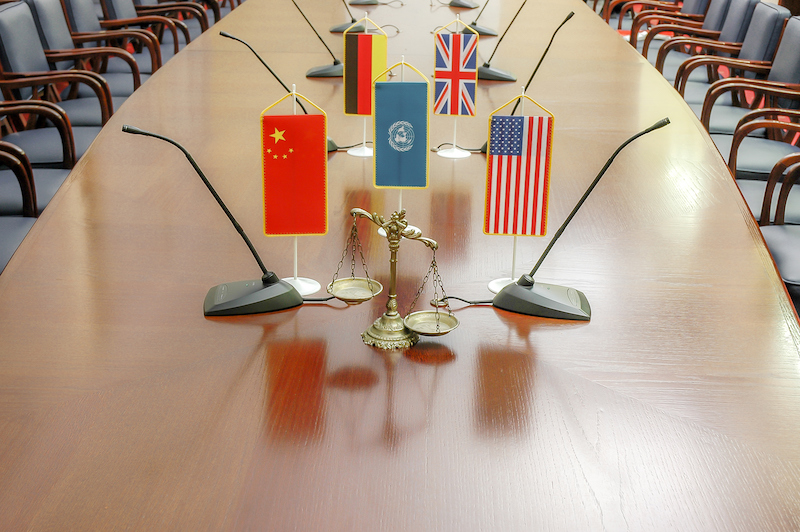
Domestic regulators should import international considerations into their rulemaking.
The pace at which citizens and businesses interact internationally has been increasing for decades. People travel more often, digital technologies transcend national boundaries, and trade integration lies at the heart of many governmental priorities.
International integration, however, is a double-edged sword. Diseases proliferate and digital and environmental risks spread more rapidly than ever before across domestic jurisdictions.
Although technological, economic, and cultural values reach beyond the boundaries of legal jurisdictions, regulators face the challenge of increasing international cooperation practices. But can regulators expand regulatory practices beyond their borders in a sufficiently timely way that keeps pace with globalized issues?
To understand the resilience of governments’ regulatory frameworks in today’s interconnected societies, the Organization for Economic Cooperation and Development (OECD)—in its latest Regulatory Policy Outlook—measured the amount of international regulatory cooperation practices throughout different stages of the regulatory process. Although countries have made increasing efforts to facilitate the use of international evidence, expertise, and norms in domestic regulatory processes, regulators still face more work ahead, both in terms of creating high-level policy direction and in undertaking the technical aspects of domestic rulemaking.
Regulatory cooperation among countries happens for a variety of reasons, including to respond to imminent global risks, address humanitarian causes, or integrate economies through open trading mechanisms and synchronous fiscal policies.
International regulatory cooperation is not a new practice and can be traced back centuries. Under the Roman Republic, philosopher Cicero underlined the importance for the legislative authority to be up to date with international allies, friends, and treaties and conventions—beyond only domestic affairs.
But today, international expertise, rules, standards and politics are separated from the realities of most domestic regulators and policymakers. The disconnect between domestic rulemaking and international interaction is caused by governance systems with ill-defined roles, responsibilities, and systematic processes that do not embed international knowledge into domestic rulemaking. The OECD’s recommendation on international regulatory cooperation aims to help governments avoid such shortcomings, be more resilient in the face of global crises, and prepare better to address policy issues which increasingly have transboundary origins or consequences.
Most countries lack a whole-of-government strategy—a strategy where domestic regulators take into account international considerations when regulating. The OECD’s Regulatory Policy Outlook showed that only six out of 38 member countries have a whole-of government, cross-sectoral policy of cooperation. Most countries have partial policies focused on specific sectors, and about 25 percent of countries do not have any policy at all for regulatory cooperation.
Having a whole-of-government policy for international regulatory cooperation fosters proper legal and institutional frameworks, allowing sectoral agencies to entertain international considerations when developing or assessing regulation. Regulators’ consideration of the international dimensions of their regulatory decisions, however, tends to be the exception rather than the norm. Moreover, regulators’ lack of preparedness makes it all the more difficult to cooperate with foreign jurisdictions when unpredicted risks arise.
This was exactly the case when the COVID-19 pandemic broke. Most countries acted unilaterally, often in counterproductive ways. The OECD documented at least 24 countries that banned or limited the export of medical equipment, such as masks, medicines, and medical equipment. Not only did these export policies harm other countries, but they harmed the adopting countries’ own citizens as well.
To avoid these detrimental, unilateral responses, governments need to make international considerations part of everyday rulemaking. In practice, regulators can engage in international cooperation in the different stages of the life of a regulation—during ex ante assessments, enforcement, and ex post evaluations. In this regard, the results of the Regulatory Policy Outlook were not particularly positive. OECD members have not adopted systematic practices of engaging with international peers, even though a variety of means are at their disposal to reach out to foreign stakeholders.
This is not to say that regulators never take into account international considerations when developing regulations. Countries have increasingly recognized their rules as having effects on populations both close to and far from them. The Regulatory Policy Outlook surveyed three different ways that regulators can assess international impacts when developing domestic regulations: impacts on trade, market openness, and foreign jurisdictions. Most countries assess these impacts, even if not systematically. Approximately 74 percent of countries assess impacts on trade; 50 percent of countries assess impacts on foreign jurisdictions; and 82 percent of countries assess impacts on market openness.
When governments perform ex post evaluations of their regulations—the last stage of the regulatory cycle—international considerations can be a helpful tool. The Regulatory Policy Outlook surveyed whether countries assessed the costs of diverging from international standards. Assessment of regulations after their enforcement is not a fully adopted practice across OECD member countries. About 39 percent of OECD member countries reported never assessing costs at all in their post evaluations of regulations. And less than a third of these countries reported assessing whether their regulatory costs were in line with international standards.
The Regulatory Policy Outlook’s data on international regulatory cooperation do not necessarily reflect the intensity of international activities performed by domestic regulators. OECD researchers have studied roughly 50 international organizations which provide dedicated regional fora to achieve further regulatory integration. These organizations have participated in a plethora of bilateral agreements with internationally minded countries.
The Regulatory Policy Outlook shows that governments still need to embed international considerations into their systematic domestic rulemaking. Regulatory frameworks are still far from fully reflective of the richness, breadth, and growth of international activity. The time has now come to rethink rulemaking through international regulatory cooperation.
This essay is a part of a nine-part series entitled, A Global Regulatory Policy Outlook.
This contribution builds on the publication OECD (2021), OECD Regulatory Policy Outlook 2021, OECD Publishing, Paris, https://doi.org/10.1787/38b0fdb1-en. The additional opinions and arguments employed herein are those of the authors and do not necessarily reflect the official views of the OECD or of its Member countries.





